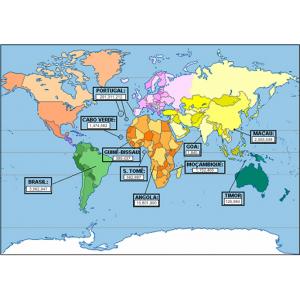Grammar & Resources
The group is centered on modeling linguistic knowledge, integrating interfaces between different areas of grammar and knowledge about how language is put to use. Joint work in formal phonology, lexicon, syntax and semantics allows building an integrated model of grammar, considering how it is represented in the human mind, as well as how it can be computationally modelled; work on L1 and L2 acquisition is at the core of this work. The integration of models of language representation and models of language use is achieved through the study of corpora.
The production of corpora and resources is justified by the goal of developing documentation and providing descriptions of contemporary European Portuguese, but also of understudied contact languages or varieties (Portuguese-based creoles, national varieties of Portuguese in Africa and Asia). The group also produces resources for the study of L1 and L2 acquisition in different settings. The group integrates CLARIN LP.
Research on L1 and L2 acquisition contributes to CLUL’s general purpose of effectively articulating fundamental and applied research, namely in the areas of Educational Linguistics and Clinical Linguistics.
General goals:
- To produce new resources for the study of Portuguese and Portuguese-based creoles;
- To pursue basic research on natural language modeling, integrating knowledge on interfaces between language modules;
- To continue the documentation and description of understudied creoles and new varieties of Portuguese that emerged in a context of language contact;
- To develop the study of language acquisition with an emphasis on language contact situations (see new international Heritage Language Consortium) and on the comparison between typical and atypical development;
- To explore the potential of comparative linguistics in the production of resources for translation and to promote connections with the industry in the area of translation.
Membros
Integrated members with PhD
Integrated members without PhD
Colaboradores
Concluded
| Project | Date | Fin. |
|---|---|---|
| ParlaMint II - ParlaMint II | - | |
| PALMA - Possession and Location: Microvariation in African Varieties of Portuguese (PALMA) | - | FCT
|
| RECAP - RECAP: Resources for Portuguese Learning | - | FCG
|
| CLARIN - CLARIN | - | |
| Documentation of Sri Lanka Portuguese | - | |
| LeCIEPLE - LeCIEPLE - Learner Corpus: da investigação ao ensino de Português Língua Estrangeira/Língua Segunda | - | FCG
|
| Portuguese-based creoles of the Dravidian space: Diachrony and synchrony | - | |
| TAXE - TAXE - Parataxis, Hypotaxis and Interface Syntax-Discourse | - | |
| COPAS - COPAS - Contrast and Parallelism in Speech | - | |
| CLAP - CLAP - Complement clauses in the Acquisition of Portuguese | FCT
|
|
| SemiAutLex.PT - SemiAutLex.PT - Semi-automatic construction of relational lexica for Portuguese | - | FCT
|
| SynExtract - SynExtract - automatic extraction of synonymy relations for a cost-effective acquisition of language resources | - | FCT
|
. (2007). Variação Paramétrica e Elipse do vP. Cadernos De Estudos Lingüísticos, 49(2), 195-206. http://doi.org/https://doi.org/10.20396/cel.v49i2.8637187 |
. (2006). Coordination de phrases vs.Subordination Adverbiale - Propositions Causales en Portugais. Faits De Langues: Revue De Linguistique ─ Coordination Et Subordination: Typologie Et Modélisation, 28, 169-180. Retrieved from https://brill.com/view/journals/fdl/28/1/fdl.28.issue-1.xml |
. (2006). Do projecto PE-PB ao 1º CILP: descrição do Português e teoria da gramática. Letras De Hoje - Português Brasileiro & Português Europeu: Estudos Em Morfologia, Sintaxe, Aquisição E Processamento, 41(1), 11-27. |
. (2006). Anáfora do Complemento Nulo: anáfora profunda ou de superfície? Evidência do Português Brasileiro e Europeu. Letras De Hoje - Português Brasileiro & Português Europeu: Estudos Em Morfologia, Sintaxe, Aquisição E Processamento, 41(1), 121-141. |
. (2006). Apresentação . Letras De Hoje Letras De Hoje - Português Brasileiro & Português Europeu: Estudos Em Morfologia, Sintaxe, Aquisição E Processamento, 41(1), 5-9. |
. (2005). Local licensers and recovering in VP ellipsis. Journal Of Portuguese Linguistics, 4(2), 79-112. http://doi.org/https://doi.org/10.5334/jpl.160 |
. (2002). On the Syntax of Canonical Comparatives in European Portuguese. Journal Of Portuguese Linguistics, 1(1), 41-81. http://doi.org/https://doi.org/10.5334/jpl.48 |
. (2002). VP ellipsis in European and Brazilian Portuguese — a comparative analysis. Journal Of Portuguese Linguistics, 1(2), 177-195. http://doi.org/http://doi.org/10.5334/jpl.41 |
. (2001). Elipse do VP no Português Europeu e no Português Brasileiro. Boletim Da Associação Brasileira De Lingüística, Nº. Especial I, Ii Congresso Internacional Da Abralin. Fortaleza, Março De 2001. Anais – Vol. I, 26, 386-390. |
. (2000). Across-the-Board clitic placement in Romance languages. Probus, 12(2), 229-259. http://doi.org/https://doi.org/10.1515/prbs.2000.12.2.0 |
. (1999). Negative Concord and the Scope of Negation. Catalan Working Papers In Linguistics, 7, 175-190. Retrieved from https://ddd.uab.cat/pub/cwpil/1132256Xv7/1132256Xv7p1.pdf |
. (1999). Despojamento e contraste sintagmático: duas estratégias sintácticas exibindo o mesmo processo linguístico-cognitivo. Veredas – Revista De Estudos Lingüísticos, 3(1), 43-60. Retrieved from https://www.ufjf.br/revistaveredas/files/2009/12/artigo26.pdf |
. (1990). A Língua Portuguesa no Projecto Eurotra. Revista Letras De Hoje, 25(4), 57-73. |
. (2013). Increasing density through new relations and POS encoding in WordNet.PT: consistency, coverage and applications. International Journal Of Computer Applications, Vol. 4, nº 1, 11-27. |
. (2007). Using WordNet.PT for translation: disambiguation and lexical selection decisions. International Journal Of Translation, Vol. 19. |
. (2012). A concordância de p6 em português falado. Os traços pronominais e os traços de concordância . Papia, 22 (1), 161-187. |
. (2014). A Fonética Forense na produção de prova no ordenamento jurídico português. Revista Virtual De Estudos Da Linguagem - Revel 12, 23, edição temática de Linguística Forense(70). |
. (2012). Todas as Codas são frágeis em Português Europeu?. Linguística 8. http://doi.org/DOI: https://doi.org/10.31513/linguistica.2012.v8n1a4479 |
. (2013). Cross-linguistic influence at lexical level. A Study With Moroccan Learners Of Portuguese As An L3/Ln. Revista Nebrija De Lingüística Aplicada, 13. |
. (2006). Formação contínua de professores de Língua Portuguesa - o caso de Cabo Verde. Contacto - Revista Da Universidade Jean Piaget De Cabo Verde, 1, 167-176. |
. (2006). Portuguese Expressions of Duration and their English Counterparts. Journal Of Portuguese Linguistics, 5.1, 37-73. pdf178.23 KB
|
. (2004). Aspectual verbs in European and Brazilian Portuguese. Journal Of Portuguese Linguistics 3. |
. (2002). The causee in the faire-Inf construction of Portuguese. Journal Of Portuguese Linguistics 1. |
. (1999). Minimal projections: Evidence from defective constructions in European Portuguese. Catalan Working Papers In Linguistics, 7, 59-69. |
. (2006). Book review: Pires. A. (2006). The Minimalist Syntax Of Defective Domains. Gerunds And Infinitives. Amsterdam: John Benjamins. Journal Of Portuguese Linguistics, 6. |
. (1995). Book review: Mollica. M. C. (1995). (De) Que Falamos? Rio De Janeiro: Tempo Brasileiro. Revista Internacional Da Língua Portuguesa, 17, 172-173. |
. (1992). Book review: Ambar. M. (1992). Para Uma Sintaxe Da Inversão Sujeito-Verbo Em Português. Lisboa: Colibri. Revista Internacional Da Língua Portuguesa, 7, 134. |
. (2018). Book review of Nicolas Quint 2015, Cape Verdean: Language and Culture (English and Creole Edition). Battlebridge Publications. Journal Of Pidgin And Creole Linguistics, 31. |
. (2018). Review of Romance Languages and Linguistic Theory 12. Selected Papers From The 45Th Linguistic Symposium On Romance Languages (Lsrl), Campinas, Brazil. John Benjamins Publishing Company. Journal Of Portuguese Linguistics, 17. |
. (2015). O papel da L1 e da L2 na aquisição lexical de português L3. Revistaliletrad, 1, 299-310. |



















































